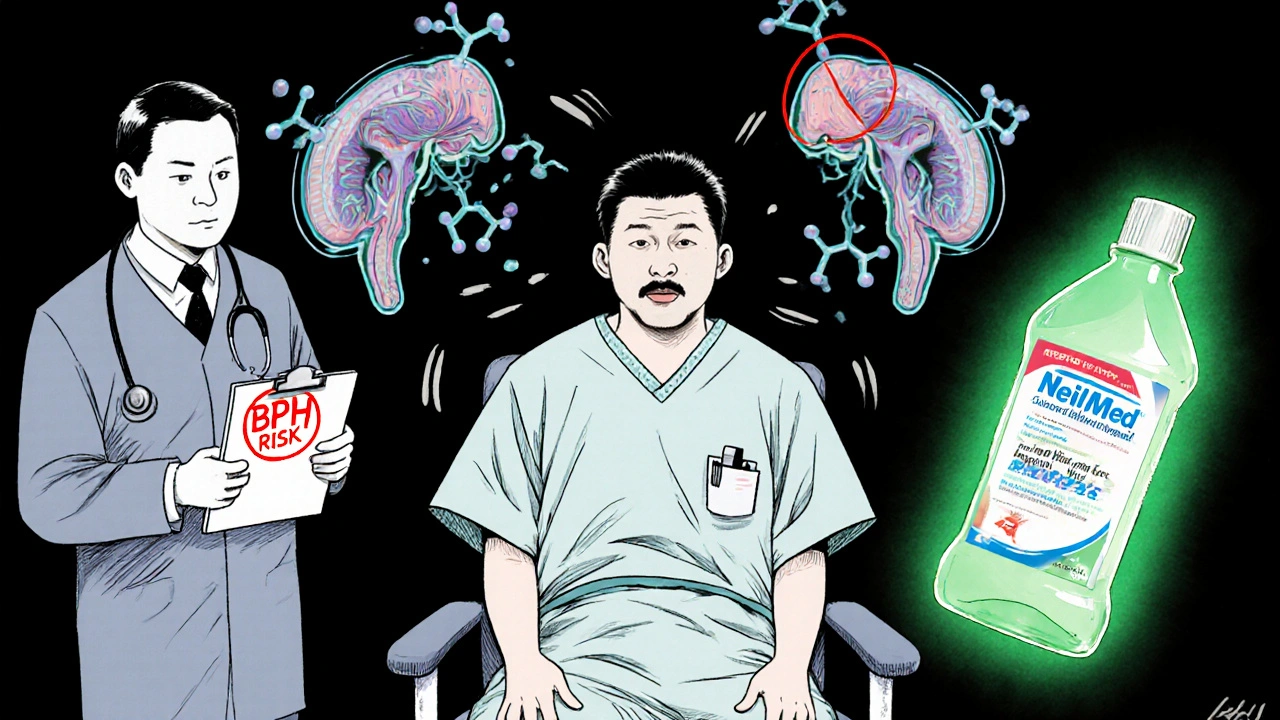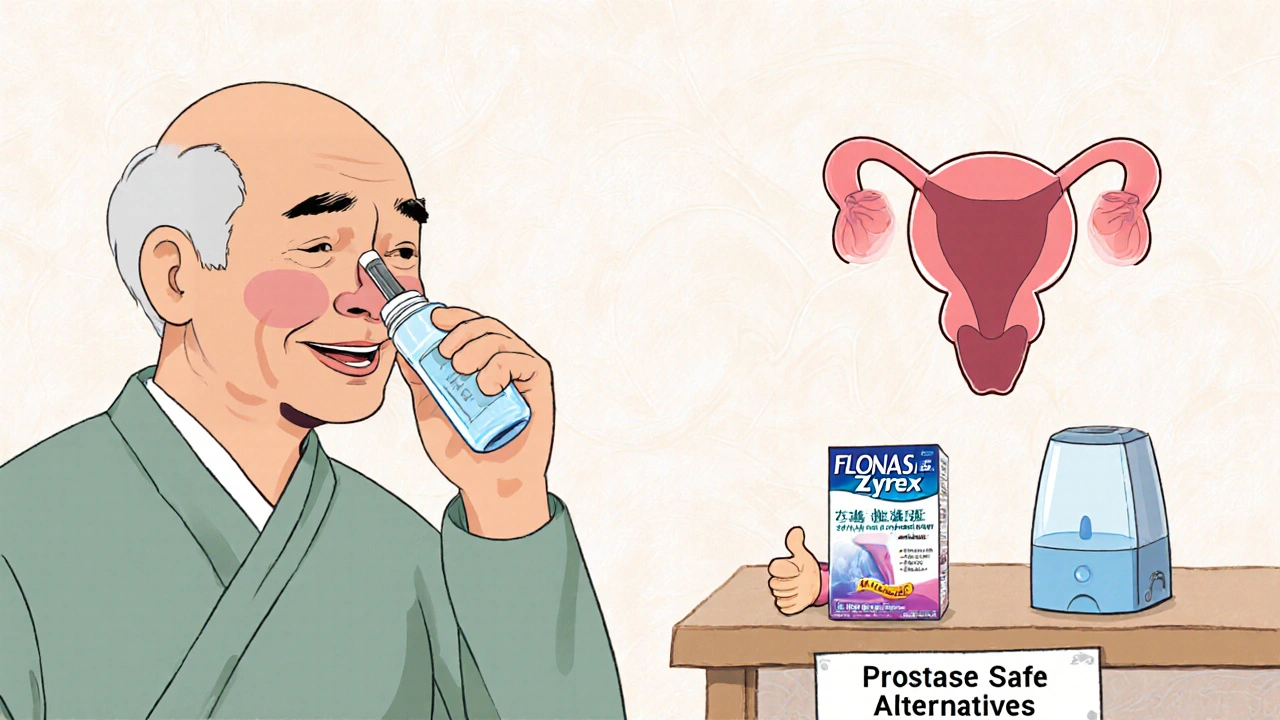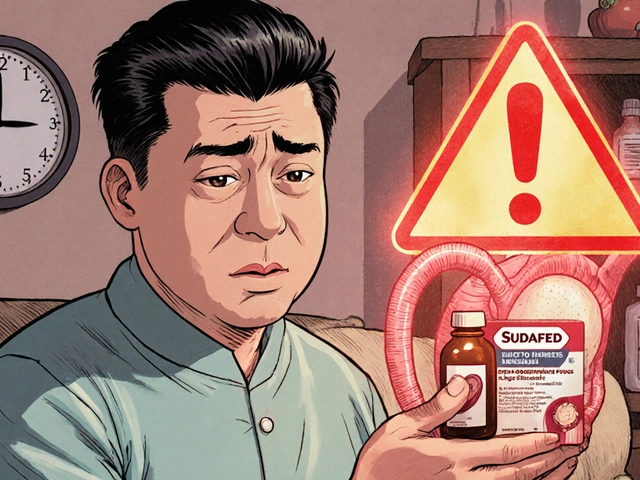BPH Decongestant Safety Checker
This tool helps determine if common decongestants are safe for you based on your BPH severity and age. Always consult your doctor before changing medications.
Check Your Decongestant Safety
Safety Assessment
Men over 50 with an enlarged prostate-known as benign prostatic hyperplasia (BPH)-often face a quiet but dangerous risk when they reach for a common cold medicine. Decongestants like pseudoephedrine, found in Sudafed and dozens of over-the-counter remedies, can trigger acute urinary retention. This isn’t a mild inconvenience. It’s a medical emergency that can leave you unable to urinate for hours, requiring catheterization and hospital visits.
What Happens When Decongestants Meet an Enlarged Prostate
BPH affects about half of men by age 60 and up to 90% by age 85. The prostate gland grows larger over time, squeezing the urethra and making it harder to start urinating, maintain a strong stream, or fully empty the bladder. These symptoms are already frustrating enough. But when you take a decongestant, things get worse-fast.Decongestants like pseudoephedrine and phenylephrine work by tightening blood vessels in the nose to reduce swelling. But they don’t stop there. These drugs also activate alpha-1 receptors in the prostate and bladder neck. These receptors control smooth muscle tone. When stimulated, they cause the prostate to contract even more, increasing resistance in the urethra by 35-40%. In men with BPH, that’s like turning a narrow hallway into a pinched pipe.
A 2021 study in the Journal of Urology found that men with BPH who used pseudoephedrine were 2.8 times more likely to develop acute urinary retention. In some cases, the bladder becomes so full that it overflows without warning. Patients report feeling pressure, discomfort, or nothing at all-no urge to go, even when the bladder is stretched to its limit.
Pseudoephedrine vs. Phenylephrine: Not All Decongestants Are Equal
Not every decongestant carries the same level of risk. Pseudoephedrine is the worst offender. It’s absorbed systemically, meaning it circulates through your bloodstream and reaches your prostate. A 2022 meta-analysis in Urology showed pseudoephedrine increases the odds of urinary retention by 3.45 times compared to not using it at all.Phenylephrine, often listed as the "alternative" on drug labels, is slightly less risky-but still dangerous. It causes a 15-20% increase in urethral resistance, enough to push men with moderate BPH into retention. And because it’s now the main ingredient in many "pseudoephedrine-free" cold medicines, people mistakenly think it’s safe. It’s not.
Nasal sprays like oxymetazoline (Afrin) are a different story. They act locally in the nose and don’t enter the bloodstream in significant amounts. Studies show they carry only a minimal risk (odds ratio of 1.25), making them a better option for short-term use. But even these shouldn’t be used for more than three days in a row-they can cause rebound congestion.
Age Makes It Worse
Risk doesn’t just depend on whether you have BPH-it depends on how old you are and how severe your symptoms are.Men under 50 with mild BPH might tolerate a single dose without issue. But for men over 70, the numbers shift dramatically. A 2016 NIH study found that 51.8% of men over 70 using pseudoephedrine developed subclinical voiding dysfunction-meaning their urinary flow slowed, they strained more, or they felt incomplete emptying-without even realizing it was the medication’s fault.
That’s why the American Geriatrics Society’s 2023 Beers Criteria lists pseudoephedrine as a "potentially inappropriate medication" for men over 65 with BPH. The European Association of Urology goes further: they recommend avoiding all systemic alpha-agonists entirely in men with BPH. The data doesn’t lie. Eighty-five percent of acute urinary retention cases in men over 65 are linked to decongestant use, according to the NIH’s 2022 Medication Safety Alert.

Real Stories, Real Consequences
Online forums are full of stories from men who didn’t realize the danger until it was too late.One Reddit user, u/BPH_Warrior, took a 30mg dose of pseudoephedrine for a stuffy nose. Within hours, he couldn’t urinate at all. "I could feel my bladder filling but couldn’t push anything out," he wrote. "It lasted 12 hours until the ER catheterized me." He spent two days in the hospital.
On the Prostate Cancer Foundation forum, 76% of 187 men reported urinary problems after taking pseudoephedrine. More than one in three needed emergency catheterization. On Healthline’s BPH community, 68% of 1,245 men said their symptoms worsened after using decongestants-with an average 4.7-point spike on the International Prostate Symptom Score (IPSS). That’s a significant jump.
There are exceptions. A few men, like one user on Drugs.com who said, "I’ve used Sudafed for years without issue," report no problems. But that’s luck-not safety. Individual sensitivity varies, and waiting for symptoms to appear before acting is a dangerous gamble.
What You Can Do Instead
You don’t have to suffer through congestion to protect your urinary health. Safer, effective alternatives exist.- Saline nasal irrigation (like NeilMed Sinus Rinse) works for 68% of users, according to a 2022 Cochrane Review. It flushes out mucus without any drug interaction.
- Intranasal corticosteroids such as fluticasone (Flonase) reduce inflammation in the nasal passages. They’re effective in 72% of cases and have zero impact on urinary function.
- Second-generation antihistamines like loratadine (Claritin) or cetirizine (Zyrtec) help with allergies without the urinary risks. First-gen ones like diphenhydramine (Benadryl) are worse-they’re anticholinergic and can worsen retention.
- Steam inhalation and humidifiers are simple, free, and effective for temporary relief.
Many men who switched to saline rinses reported better results than they ever had with decongestants. On Amazon, 82% of 457 reviewers rated NeilMed Sinus Rinse as "very effective"-with no mention of urinary side effects.

When Decongestants Can’t Be Avoided
Sometimes, you need relief. If you’re under a doctor’s care and have mild BPH (IPSS score under 8), your urologist might allow a single, low-dose dose of pseudoephedrine (30mg max) for a short period.But even then, there’s a protocol. The Cleveland Clinic found that combining pseudoephedrine with an alpha-blocker like tamsulosin (Flomax) reduces retention risk by 85%. The trick? Start the alpha-blocker at least 72 hours before taking the decongestant. This relaxes the prostate and bladder neck muscles, counteracting the tightening effect.
And never take decongestants for more than two days in a row. The Prostate Cancer Foundation’s "48-hour rule" isn’t arbitrary-it’s based on the half-life of pseudoephedrine (12-16 hours) and how long urinary symptoms can linger after a single dose. Symptoms can persist up to 24 hours, even after the drug leaves your system.
What Doctors and Pharmacies Are Doing
The medical community is waking up. In January 2022, the FDA required all pseudoephedrine packaging to include a clear warning about urinary retention risk for men with BPH. Patient awareness jumped from 28% in 2021 to 63% in 2023.Pharmacists are now trained to screen men over 50 before selling decongestants. The American Pharmacists Association’s 2023 guidelines require them to ask: "Do you have trouble urinating?" If yes, they must offer alternatives.
Urology practices are now including decongestant avoidance in routine BPH management. Seventy-eight percent of practices do this now, up from just 35% five years ago. The European Medicines Agency is considering restricting pseudoephedrine sales to men over 50 entirely.
What You Should Do Today
If you have BPH:- Check every cold, flu, or allergy medicine you buy. Look for pseudoephedrine, phenylephrine, or ephedrine on the label.
- Ask your pharmacist: "Is this safe for someone with an enlarged prostate?" Don’t assume it is.
- If you’re already using decongestants and notice worse urinary symptoms-slower stream, straining, feeling like you can’t empty your bladder-stop immediately and call your doctor.
- Try saline rinses or nasal steroids first. They work better than you think.
- If you’re on an alpha-blocker like tamsulosin, talk to your urologist about whether you can safely use decongestants under supervision.
This isn’t about avoiding cold medicine forever. It’s about making smart choices so you don’t end up in the ER because of something you bought at the drugstore. Your prostate doesn’t need to be the collateral damage of a stuffy nose.
Can pseudoephedrine cause complete urinary retention in men with BPH?
Yes. Pseudoephedrine can trigger acute urinary retention in men with benign prostatic hyperplasia (BPH). This means the bladder fills completely but the person cannot urinate. Studies show a 2.8-fold increase in risk, and many cases require emergency catheterization. The drug tightens muscles in the prostate and bladder neck, worsening existing obstruction.
Is phenylephrine safer than pseudoephedrine for men with BPH?
Phenylephrine is slightly less risky than pseudoephedrine, but still dangerous. It increases urethral resistance by 15-20% compared to 35-40% with pseudoephedrine. It’s not a safe alternative-just less dangerous. Both should be avoided by men with moderate to severe BPH symptoms.
What decongestants are safe for men with BPH?
Nasal sprays like oxymetazoline (Afrin) are the safest because they’re absorbed locally and don’t enter the bloodstream significantly. But they should only be used for up to three days. The best long-term options are non-drug treatments: saline nasal irrigation and intranasal corticosteroids like fluticasone. Second-generation antihistamines like loratadine are also low-risk.
How long does urinary retention last after taking pseudoephedrine?
Symptoms can begin within 1-2 hours and last up to 24 hours after a single dose, due to pseudoephedrine’s 12-16 hour half-life. Even after the drug leaves your system, the muscle constriction in the prostate and bladder neck can persist. This is why the "48-hour rule"-avoiding decongestants for more than two days-is strongly recommended.
Should I stop my BPH medication if I need a decongestant?
Never stop your BPH medication without talking to your doctor. If you must use a decongestant, your urologist may recommend starting or continuing an alpha-blocker like tamsulosin. Studies show combining tamsulosin with pseudoephedrine reduces retention risk by 85%. But this should only be done under medical supervision.


Marcia Facundo
I took Sudafed last winter for a cold and ended up in the ER. Didn’t even know it could do that. My husband said I should’ve read the label but I didn’t think it was that serious. Now I check every single pill before I touch it. Scary stuff.
Ajay Kumar
Let’s be real-this whole article is a fearmongering masterpiece disguised as medical advice. You’re telling men to avoid pseudoephedrine because of a 2.8x increased risk? That’s still less than a 1% chance of retention for most. Meanwhile, you ignore that 80% of men over 50 already have some degree of BPH and are living fine without being terrified of every cold medicine. You’re pathologizing normal aging. And phenylephrine being ‘less dangerous’? That’s like saying a paper cut is less dangerous than a knife wound-both still hurt, and both can be avoided with common sense. Why not just tell people to drink more water and sleep better instead of turning every sinus issue into a urological emergency?
Joseph Kiser
This is exactly why we need better public health literacy. 🤦♂️ I’ve seen guys in their 60s pop Sudafed like candy because ‘it’s OTC’-as if that means it’s harmless. The truth? Your prostate isn’t a suggestion box. It’s a physical structure with nerves and muscles that respond to drugs like a light switch. Pseudoephedrine doesn’t ‘cause’ retention-it triggers it in people whose bodies are already on the edge. And yes, the data is terrifying: 85% of retention cases in men over 65 are drug-induced. That’s not a coincidence. That’s a public health failure. If your pharmacy doesn’t ask you if you have trouble peeing before selling you decongestants, find a new one. And if you’re on Flomax? You’re not ‘safe’-you’re just less likely to implode. Still avoid the stuff. Your bladder will thank you. 🙏
Hazel Wolstenholme
One cannot help but observe the alarming epistemological lacuna in contemporary pharmacological consumer behavior. The notion that ‘over-the-counter’ equates to ‘risk-free’ is not merely a misapprehension-it is a catastrophic conflation of accessibility with safety. One might as well assert that a loaded firearm is innocuous because it is sold at a convenience store. The data presented herein, rigorously sourced and statistically robust, ought to compel a paradigmatic shift in public health discourse. To dismiss these findings as alarmist is to indulge in the very epistemic negligence that has precipitated the current crisis of iatrogenic urinary dysfunction among geriatric males. One must ask: Is convenience truly worth the catheter?
Mike Laska
I had this happen to me. 3am. 5am. 7am. I was literally crying. I could feel it swelling like a water balloon inside me. My wife had to drive me to the ER. The nurse said, ‘Sir, did you take anything for your cold?’ I said ‘Yeah, Sudafed.’ She looked at me like I’d just admitted to eating a whole cake before surgery. I didn’t know. Nobody told me. Now I keep a NeilMed bottle next to my toothbrush. Best decision ever. Also, I cried in the ER. Don’t be that guy.
Alexa Apeli
This is such an important post! 💙 Thank you for sharing the science and the stories-it’s clear, compassionate, and life-saving. So many men suffer in silence because they don’t realize their symptoms are drug-induced. Please, if you’re reading this and you’re over 50: check your medicine cabinet today. Swap out decongestants for saline rinses or Flonase. You deserve to breathe AND urinate without fear. 🌿💧 #BPHAwareness #SafeMedication
Eileen Choudhury
Love this! So many of us in India don’t even know this risk exists. My uncle took cold pills and ended up in the hospital-no one warned him. Now I tell every older guy I know: ‘Don’t touch Sudafed!’ Saline rinse works better than anything anyway. And it’s cheap-just salt, water, and a neti pot. No side effects, no drama. We don’t need fancy drugs to clear a nose. Sometimes the simplest things are the safest. 🙏
Zachary Sargent
So let me get this straight-I can’t take Sudafed because my prostate is being a drama queen? I’m 62, I’ve had a slow stream since 2015, and I’ve taken this stuff for 20 years. I’m fine. You’re acting like this is some secret government plot to catheterize old men. Chill. Not everyone’s a ticking time bomb.
Melissa Kummer
Thank you for this comprehensive and meticulously researched overview. The integration of clinical data with real-world patient narratives significantly enhances the communicative efficacy of public health messaging. I have shared this article with my father, who is currently managing BPH, and he has since discontinued all systemic decongestants. He reports improved urinary flow within 72 hours of cessation. I encourage all individuals over the age of 50 to consult with their primary care provider regarding medication safety profiles. Prevention is always preferable to intervention. 🌟
andrea navio quiros
people just dont read labels anymore and now they blame the drug but honestly if you have an enlarged prostate and you take something that tightens muscles what do you expect it to do its not rocket science the body has receptors for a reason and if you mess with them bad things happen not that hard to understand
Pradeep Kumar
My dad in India had this happen. He took a cold tablet and couldn’t pee for 18 hours. We rushed him. Now he uses steam and warm water on his belly-works better than any pill. No side effects. No hospital. I told my cousins too. This isn’t just an American problem. It’s everywhere. Simple solutions exist. We just need to listen more and reach for pills less. 🙏
Andy Ruff
Look, I get it. You’re scared. But this is just another example of medical overreach. Men are being infantilized. You think we don’t know our own bodies? I’ve been taking pseudoephedrine since I was 40. I’m 72 now. I pee fine. I don’t need some article telling me I’m a walking emergency. The real problem? Doctors who scare patients into compliance instead of educating them. If you’re not having symptoms, don’t panic. And if you are-talk to your urologist, not Reddit. Stop treating every man over 50 like he’s one pill away from a urinary catastrophe.
Matthew Kwiecinski
Phenylephrine is not safer. The FDA admitted in 2021 that phenylephrine at oral doses is ineffective as a decongestant. So you’re not just risking retention-you’re taking a placebo that still has alpha-1 activity. The entire market is built on pseudoscience. Avoid all oral decongestants. Use saline. Use nasal steroids. Use steam. Or just wait it out. Your body will heal. Your bladder won’t.
Justin Vaughan
Here’s the thing: BPH isn’t your enemy. Decongestants are. You don’t need to live in fear of your prostate-you need to live with awareness. I used to think this was just a ‘guy thing’ you ignore until it’s too late. Then I saw my neighbor get catheterized after a cold. He didn’t even know what pseudoephedrine was. So now I’m the guy who walks into the pharmacy and says, ‘Hey, I’ve got BPH-what’s safe?’ And guess what? Most pharmacists now know the answer. It’s not magic. It’s just communication. If you’re over 50 and take anything for congestion, stop. Just stop. Try the rinse. It’s free. It’s safe. And it works better than you think. You’ve got this.
Joseph Kiser
And to the guy who says ‘I’ve taken it for years and never had a problem’-congrats. You’re the outlier. The 15%. The rest of us aren’t lucky. We’re the 85%. Don’t mistake your luck for a license to ignore the data. Your bladder doesn’t care how long you’ve been ‘fine.’ It only reacts to what’s in your bloodstream right now. Don’t test fate. Just don’t.